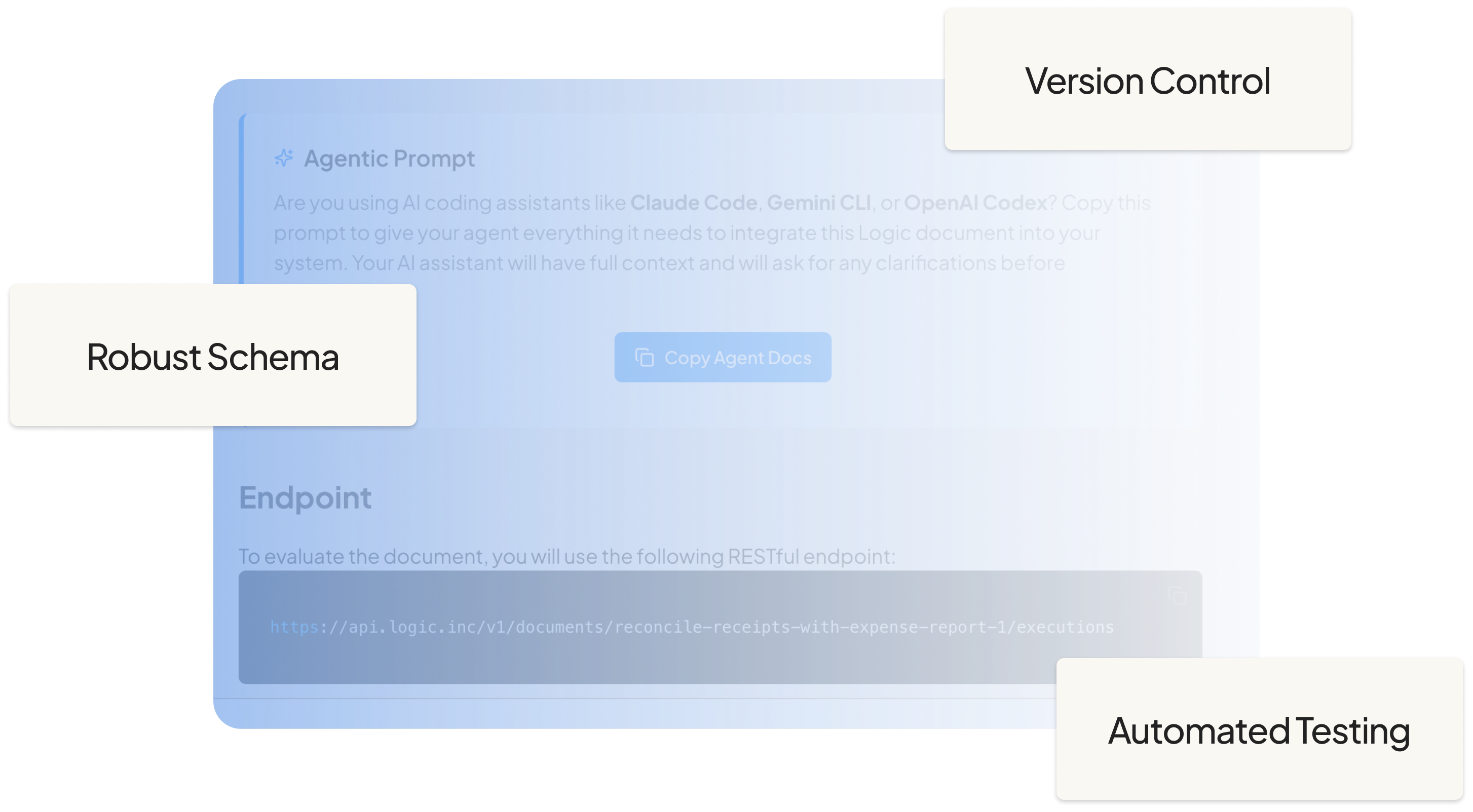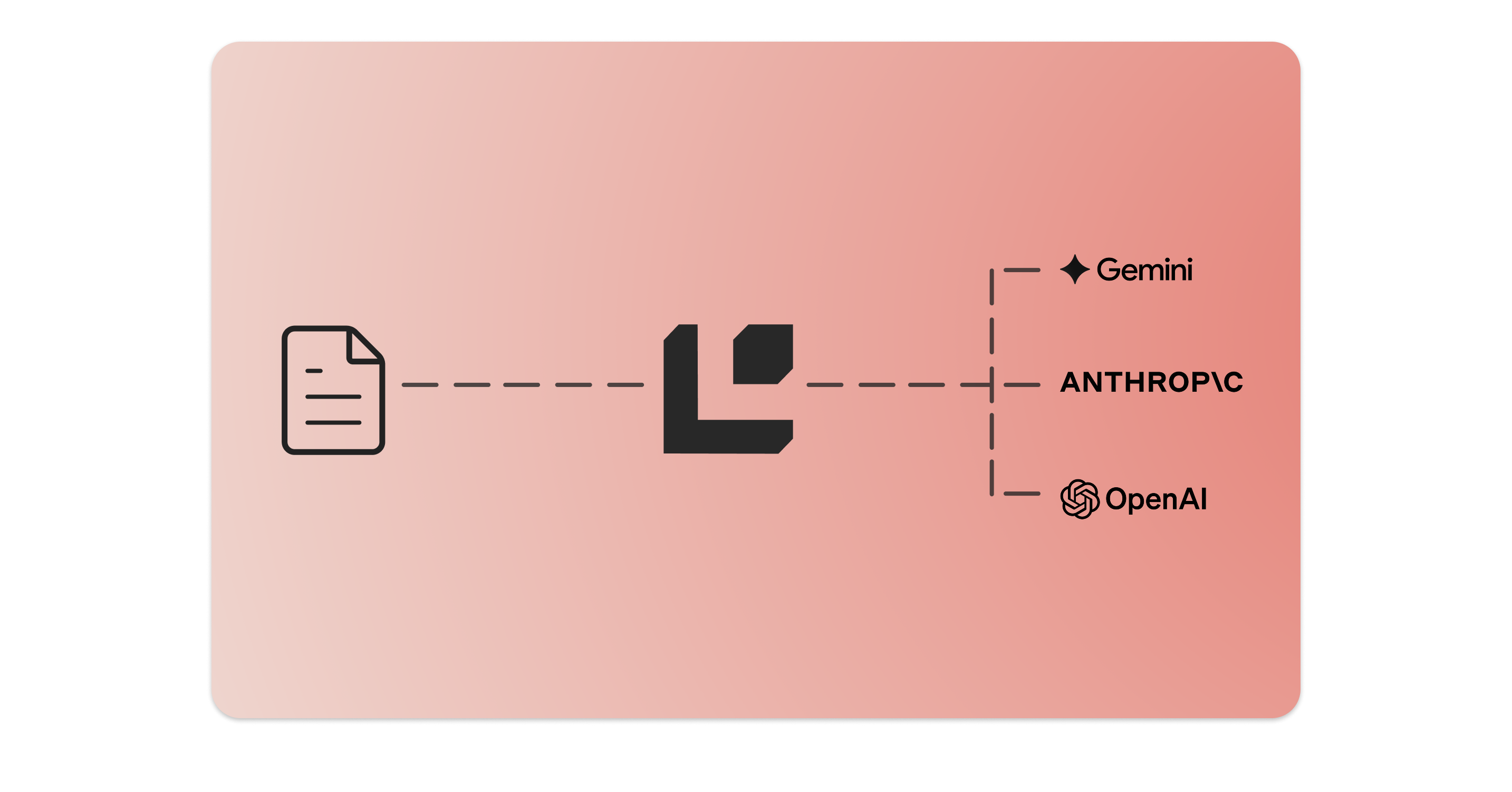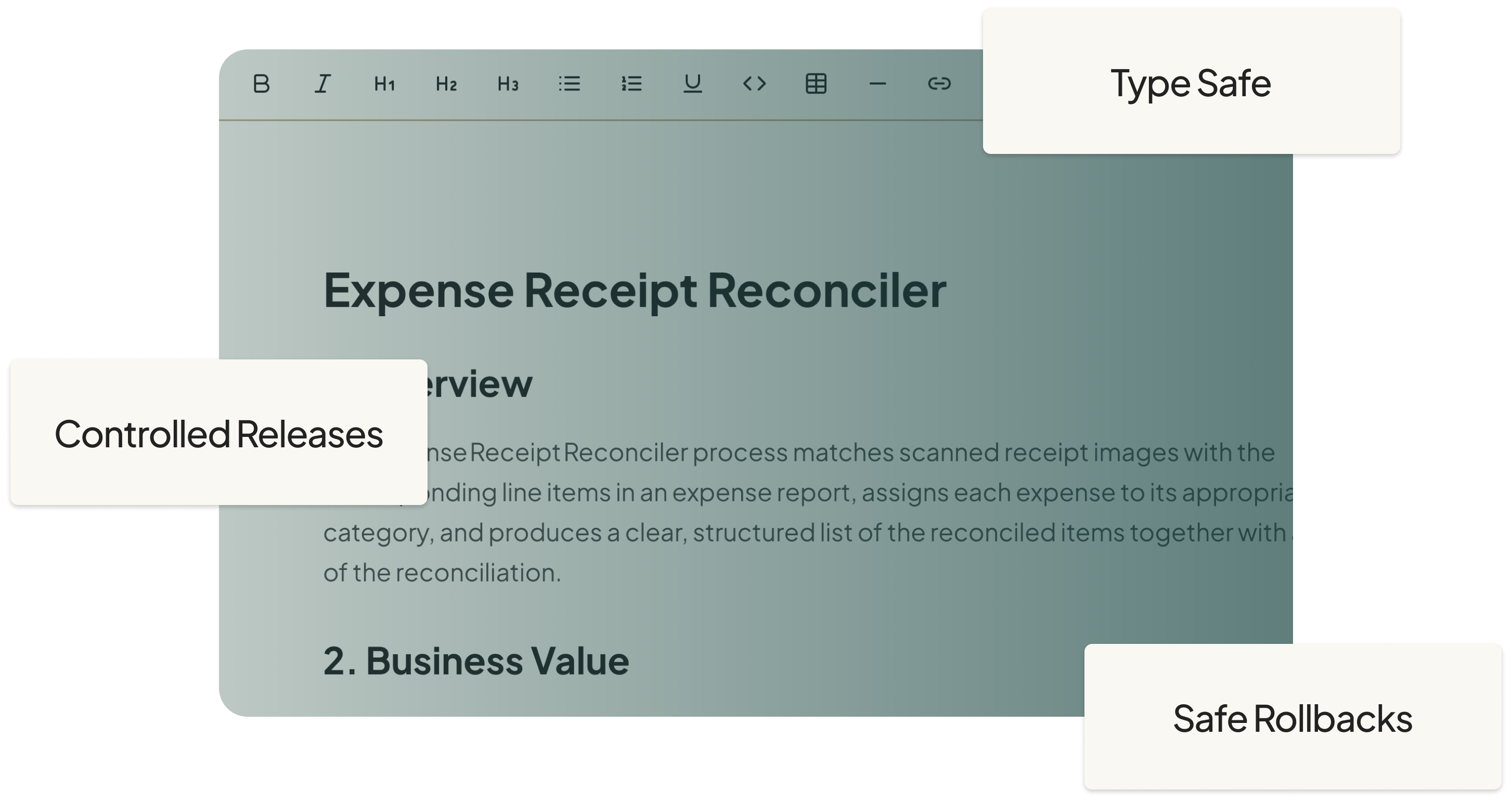Be AI-Native
Ship AI features and tools in minutes, not weeks. Give Logic a spec, get a production API—typed, tested, versioned, and ready to deploy.
From idea to production API in 60 seconds
Describe what you need in plain English or JSON. Get a production API in seconds.
Product Listing Moderation
Objective
Review a product's title and description to determine if it complies with marketplace policies and produce a clear moderation decision.
Inputs
-
Product Title(Text) -
Product Description(Text)
Outputs
A Moderation Decision table with the following columns:
-
Status("Approved" or "Rejected") -
Violations(A list of all policy breaches found) -
Comments(Optional guidance for the seller) -
Recommended Action("Publish", "Remove", or "Escalate for manual review")
Process
-
Identify Violations: Scan the
Product TitleandProduct Descriptionfor any policy breaches, using the criteria defined in the Appendix. -
Determine Status: Set the
Statusto "Rejected" if one or more violations were found; otherwise, set it to "Approved". -
Generate Decision: Populate the
Moderation Decisiontable with the finalStatus, a list of all identifiedViolations, and the appropriateRecommended Action.
Appendix: Moderation Rules & Criteria
1. Violation Definitions
| Violation Type | Criteria for Flagging |
| Prohibited Item | The listing contains terms related to weapons, drugs, adult content, counterfeit goods, hazardous materials, or other items prohibited by marketplace policy. |
| Offensive Language | The listing contains profanity, hate speech, or sexually explicit terms from the Restricted Language List. |
| Misleading Claim | The listing uses unsubstantiated phrases like "official", "certified", or "100% genuine" without verification. |
| Spam/Formatting | The title is in ALL CAPS, contains excessive punctuation (e.g., "!!!"), or includes non-standard characters like emojis. |
2. Decision Logic
| Field | Rule |
| Status | If the Violations list is empty, the Status is "Approved". Otherwise, it is "Rejected". |
| Recommended Action | "Publish": Use for approved listings. "Remove": Use for severe violations like illegal items or counterfeit goods. "Escalate": Use when a rule is ambiguous (e.g., a trademark is also a common word) or requires senior review. |
3. Special Cases
| Scenario | Handling Procedure |
| Missing Required Info | If the Product Title or Product Description is empty, Reject the listing with the comment "Missing required information". |
| Multiple Violations | Document all violations found; do not stop after the first. |
4. Reference Lists
4.1. Prohibited Items List
| Category | Examples |
| Weapons | firearms, knives, ammunition |
| Drugs & Controlled Substances | illegal drugs, prescription medication, drug paraphernalia |
| Adult Content | pornographic material, sexual accessories, explicit language |
| Counterfeit Goods | imitation designer goods, fake brand logos |
| Hazardous Materials | explosives, chemicals, radioactive items |
| Animals & Wildlife | protected species, wildlife products |
| Illegal Services | hacking services, illegal gambling |
4.3. Restricted Language
This includes, but is not limited to:
-
Profanity: A list of common profane words.
-
Hate Speech: Any slur, discriminatory term, or slander.
-
Adult Content: Words describing explicit sexual acts, genitalia, or sexual positions.
4.4. Misleading Claim Keywords
| Phrase | Reason |
| “100% free” | May imply no cost; requires verification. |
| “Official” | Requires official partnership. |
| “Certified” | Requires certification. |
| “Genuine” | Requires proof of authenticity. |
| “Original” | Must not be a copy. |
Try me
Describe what you need
Give Logic a simple spec or plain English description.
Get a production endpoint
Typed, tested, versioned, and ready to use.
Integrate
Call the API from your app. Ship to production as quickly as your CI/CD lets you.
Iterate live
Update business logic anytime. API contracts stay stable.
A year ago, we were using almost no AI. Today, we’re using it in every part of our business. Logic made that jump possible.

All the infra you won't have to build
Logic handles everything you'd normally spend weeks building before your AI is production-ready. Focus on your product, not plumbing.



















What teams ship with Logic
Document processing
Moderation workflows
Scoring and classification
Content optimization
Voice processing
Custom workflows

Ship fast, learn fast
Stop waiting for infra to be built before learning anything. Launch production AI immediately, see what works, and keep the winners.

Always use the right model for the job
Logic automatically routes requests to the optimal model across OpenAI, Anthropic, Google, and Perplexity based on complexity, cost, and latency.

Let domain experts iterate
Product and ops teams can update decision rules in plain English (if you want them to). Every change is validated, versioned, and can require engineering approval before deploy. API contracts never break.
Security and stability, handled for you
No credit card required
SOC 2 Type II and HIPAA certified
250,000+ jobs handled every month
Your data stays yours
Frequently Asked Questions
Everything you need to know about automating decisions with Logic
Under 60 seconds. Describe what you need in natural language or pass a JSON schema, and Logic generates a typed, tested, versioned API endpoint immediately. What typically takes engineering teams 4-8 weeks of infrastructure work ships instantly.
Logic includes orchestration, prompt management, schema validation, retry and fallback logic, model routing, test generation, versioning with rollbacks, and logging. These components typically require 4-8 weeks of engineering time before your first AI feature goes live.
Logic automatically routes requests to the optimal model across OpenAI, Anthropic, Google, and Perplexity. Routing decisions are based on task complexity, cost, and latency requirements. You don't need to manage model selection or switch providers manually.
Yes. Logic is SOC 2 Type II certified and HIPAA certified, with annual audits. Data is encrypted in transit and at rest, with strict access controls and full audit logging. Logic does not train on your inputs or outputs.
Yes. You can update decision rules anytime without redeploying. API contracts stay stable, and every change is validated and versioned. Built-in rollbacks let you revert instantly if needed.
Logic works well for document processing, moderation workflows, scoring and classification, content optimization, voice processing, and custom internal workflows. Teams use it to extract data from invoices and contracts, review content for compliance, evaluate leads or tickets, refine SEO copy, transcribe calls, and handle recurring decisions that need human-like judgment.